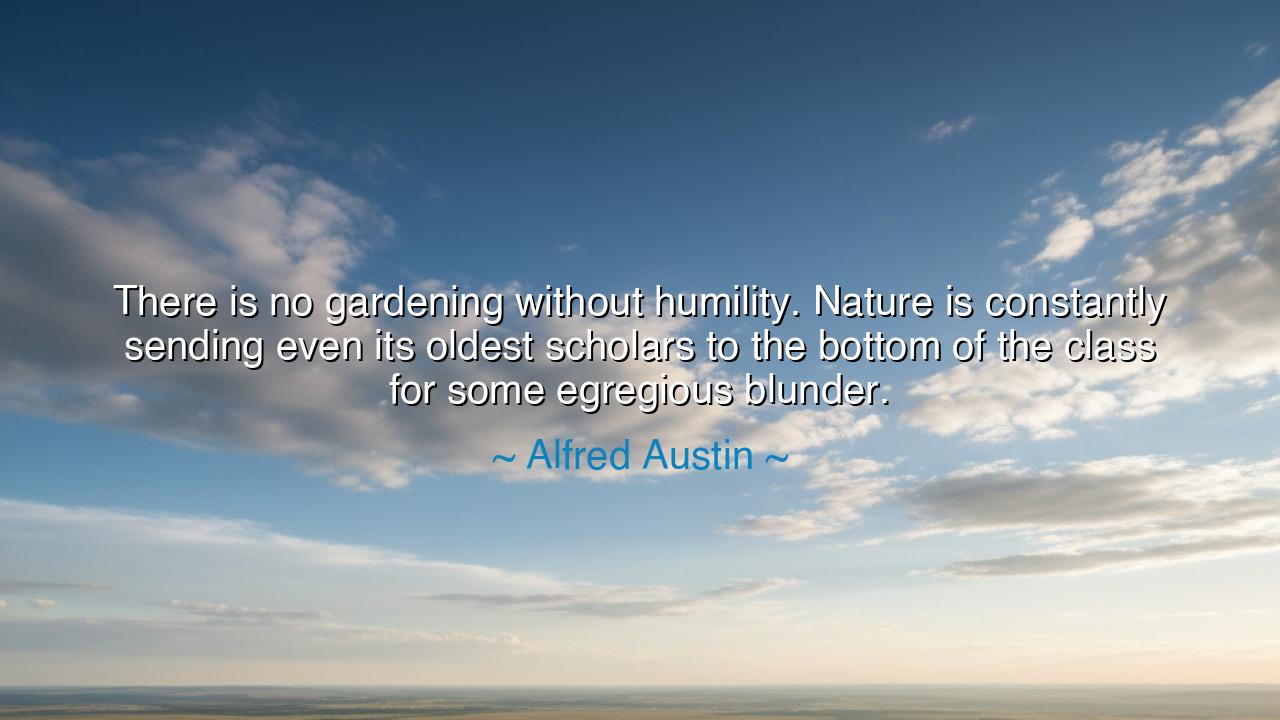
There is no gardening without humility. Nature is constantly
There is no gardening without humility. Nature is constantly sending even its oldest scholars to the bottom of the class for some egregious blunder.






The words “There is no gardening without humility. Nature is constantly sending even its oldest scholars to the bottom of the class for some egregious blunder” were written by Alfred Austin, the English poet laureate of the late nineteenth century, who was as much a lover of gardens as he was of verse. In this deceptively simple observation lies a profound meditation on the limits of human mastery, and the eternal wisdom of nature herself. Austin reminds us that the garden — that ancient symbol of creation — is not a place for pride, but for reverence. It is a living teacher, patient yet unyielding, that humbles even the most experienced hand.
When Austin declares that “there is no gardening without humility,” he speaks not only of tending soil, but of the condition of the human spirit. To garden is to enter into partnership with forces beyond one’s control — sun, wind, rain, and the hidden alchemy of life beneath the ground. No matter how skilled the gardener, no matter how carefully one plans, nature retains the final word. A storm can undo months of labor; a single frost can erase the promise of spring. Thus, the garden becomes a mirror of life itself — a realm where the illusion of mastery gives way to the reality of dependence, patience, and surrender. The humble gardener does not command; he cooperates.
Austin’s words echo the wisdom of the ancients. In every culture, those who worked the earth were regarded as philosophers in disguise — people who learned directly from the rhythms of creation. The ancient Chinese sage Lao Tzu taught that wisdom is born of yielding, not controlling; that one must be like water, flowing and adaptable. The same truth governs the gardener’s heart. Those who approach nature with arrogance are swiftly corrected. The soil accepts no vanity. The vine that once thrived may wither without warning, and the gardener, like the scholar, must begin again — humbled, yet wiser. It is through such failure that one learns the greatest lesson: nature is not conquered but communed with.
History offers many who found their humility in the garden. Consider Charles Darwin, whose revolutionary theory of evolution was not born in grand laboratories, but through years of quiet observation in his gardens at Down House. There, among worms and weeds, he learned the silent laws that govern life’s vast design. Darwin himself confessed that nature continually confounded him — that every discovery opened a hundred new mysteries. Like Austin, he understood that the closer one comes to nature’s truth, the smaller one feels before its immensity. For humility is the price of understanding.
The image of “the oldest scholars sent to the bottom of the class” is both humorous and profound. It reminds us that knowledge, no matter how vast, can never surpass the wisdom of the earth. Even the seasoned gardener — the one who believes he knows the soil, the seasons, and the cycles — will eventually err. Perhaps he overwaters, perhaps he plants too soon, or perhaps the earth itself, in her infinite will, decides to withhold her blessing. And yet, in that humiliation, there is grace. For in every failure, nature teaches anew the virtues of patience, attentiveness, and awe. It is this endless apprenticeship that keeps the gardener’s spirit alive.
In a deeper sense, Austin’s quote speaks not only of gardening but of the human condition. We are all gardeners — of our actions, our relationships, our dreams. We sow effort into the world, yet the outcomes are never wholly ours to command. Pride tempts us to believe that we are masters of destiny, but life, like the earth, will always remind us of our smallness. To live well, therefore, is to live humbly — to act with care, but to release the results to forces beyond ourselves. As in the garden, so in life: we labor, we fail, we learn, we begin again.
The lesson, then, is as enduring as the soil itself: humility is not weakness, but wisdom. The proud seek control and lose peace; the humble accept uncertainty and find understanding. The true gardener — of land or of life — rejoices in being a student forever, grateful even for the lessons of failure.
Practical actions: Cultivate humility daily. Tend something living — a plant, a relationship, a skill — and observe how it responds to your care and your neglect. When failure comes, do not despair; bow before it, and learn what it reveals. Walk among trees or fields and remember that they existed before you and will outlast you. For as Alfred Austin reminds us, nature is the great teacher of humility, and the wise are those who never cease to learn from her silent, eternal classroom.






AAdministratorAdministrator
Welcome, honored guests. Please leave a comment, we will respond soon